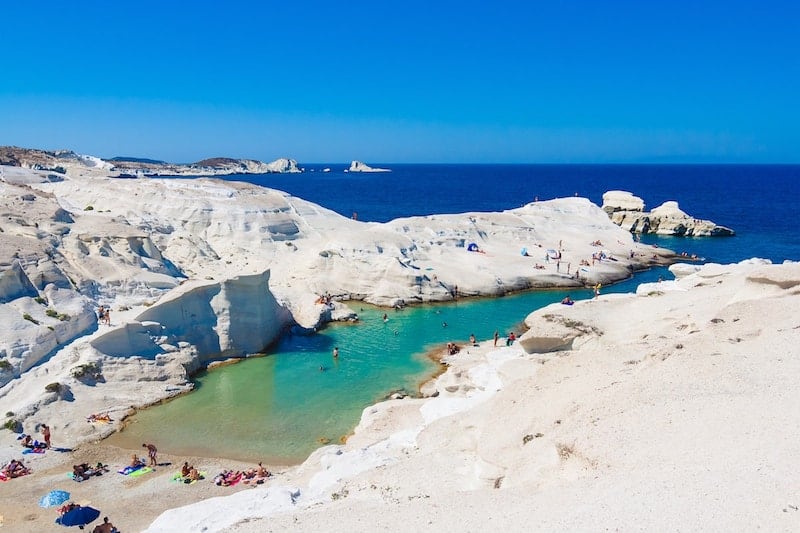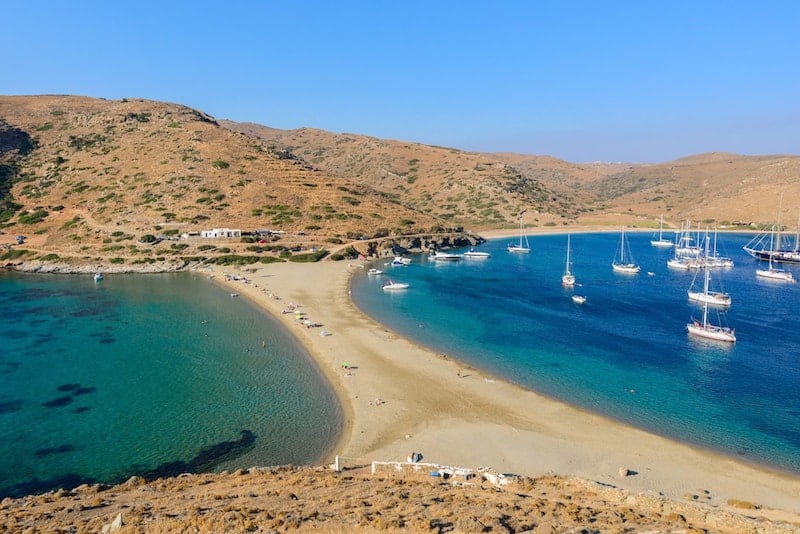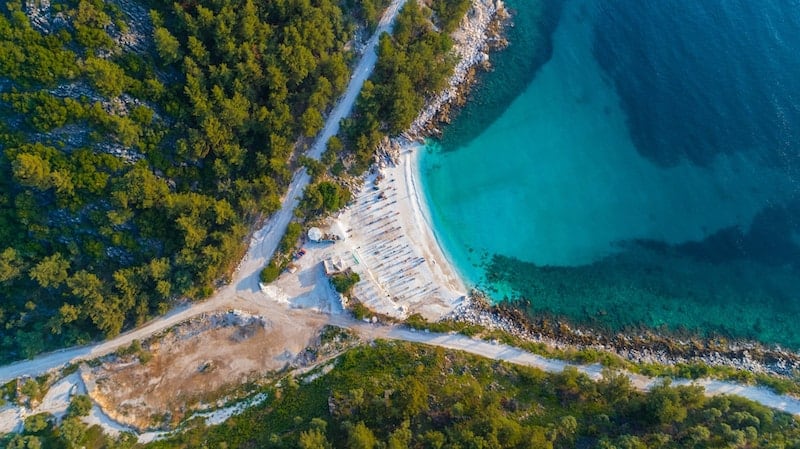Bored of endless organised sandy beaches? Let’s explore 10 of the most weird, wonderful, and unusual beaches in Greece – from bizarre volcanic formations on Milos to red sand on Santorini, orange clay on Kefalonia, and white pebbles on Thassos.
Sarakiniko, Milos

The island of Milos in the Cyclades is home to some wonderfully weird volcanic landscapes. Sarakiniko beach is up there with the weirdest (although the island also has plenty of lovely sandy beaches). The rock here is bright white and sculyted into strange lunar shapes by the wind and the water – creating caves and arches – and the chalky colour contrasts with the luminescent blue/green waters. Sarakiniko is in the north of the island, not too far from the town of Plaka.
Kolona, Kythnos

Kythnos is one of the least-visited islands in Greece, despite (or perhaps because of) being so close to Athens. Those who skip past is are missing out on this beauty of a beach. Kolona is one of several double beaches in Greece, with water on either side of its sands. Many yachts make a stop here on their way out of the marinas in Athens. If you don’t have yacht of your own then you’ll have to make do with a water taxi or an intrepid hike from the port.
Livari, Sithonia

Vourvourou is located in Sithonia, the middle part of the Chalkidiki peninsula in the north of Greece – and it’s a haven for beach lovers with countless beaches of shallow sands and turquoise waters. Vourvourou itself is a small resort town with several fantastic beaches in the area. Livari Beach is the most distinctive, it’s a long beautiful sandbar beach right opposite Diaporos and the nine islets of Vourvourou.
Red Beach, Santorini

Santorini is most famous for its whitewashed villages and sunset views, but it’s volcanic landscape also yields some unusual beaches. There are several volcanic black sand beaches on the island (the main two are Perissa and Kamari), but for something definitely different there’s the Red Beach at Akrotiri where the distinctive rusty cliffs meet swirling green seas. Unfortunately these days it’s too dangerous to visit due to the risk of landslides so you’ll have to content yourself with a glimpse from up on the hills for the time being – please don’t ignore the safety advice.
Lichadonisia

Lichadonisia is a miniature archipelago of tiny uninhabited islets in between the mainland and coast of the island of Evia. It’s made a name for itself as the Seychelles of Greece – and from the air you can see the resemblance. You can join a boat trip to Lichadonisia from Kavos on Evia or from Kamena Vourla on the mainland. Ok, so it’s not quite as tropical as the Seychelles, but if you visit outside high summer and weekends then you might have these endless islets and their tiny beaches almost to yourself.
Xi, Kefalonia

The Ionian island of Kefalonia is know for its green mountains and sumptuous pebble beaches. Well, Xi Beach has neither – instead you’ll find white cliffs and a reddish-orange sand. Xi is located on the Paliki Peninsula on the west coast of the island. In ancient times the clay was known for its medicinal properties. There days there are a few sunloungers and beach bars – it’s a popular stop with daytrippers and also for families.
Cape Drastis, Corfu

The north coast of Corfu is home to some stunning coastal scenery and it takes a particularly interesting turn at Sidari and around to the north west at Cape Drastis, where the wind and waves have whittled down the rock to stunning curved forms – complete with unique beaches at its base. It even made a guest appearance in BBC TV series The Durrells. Unfortunately the beach is usually closed to the public but you can still take in the fabulous views from the nearby viewpoint and trails.
Papafragas, Milos

Sarakiniko isn’t the only weird beach on the island of Milos. Continue to the west of Sarakiniko and you’ll find the incredible otherworldly landscapes of Papafragas. The rock here is like giant white pumice – full of crumbly cheese-holes – and the teal seas lead in and out of cave-systems and channels. There’s a small dark-sand beach but really the highlight here is the swimming and snorkelling on a sunny calm day.
Marble Beach, Thassos

Guess how Marble Beach (also known as Saliara) got its name? That’s right, the pebbles on this beach resemble giant marbles. They’re so smooth and so white that the crystal clear water becomes an intense emerald colour, reflecting the dense vegetation that surrounds the beach. It’s a bit tricky to find (the roads aren’t great) but it still gets busy in the summer months. Everyone wants a dip in those exotic colours! If you prefer a black pebble then check out Chochlaki Beach on Nisyros or Mavra Volia on Chios.
Porto Timoni, Corfu

Not far from the popular resort towns of Arillas and Agios Giorgios (N) is the photogenic double beach of Porto Timoni. It’s a 40-minute hike though boat trips will often include it on their itineraries too. It’s a pleasant hike for the moderately fit and you can also take in the beautiful historic village of Afionas.
Honourable mentions:
- Ammoglossa, Lefkada
- Ammoglossa, Meganisi
- Canal D’Amour, Corfu
- Vlychada, Santorini
- Possidi, Chalkidiki
- Konoupa, Astypaleia
Read more:
10 Most Beautiful Beaches in Greece
12 Spectacular Sandy Beaches in Greeces
11 Best Secret Beaches in Europe
15 Best Greek Islands for Beaches
10 Most Beautiful Cities in Greece
10 Most Beautiful Towns in Greece
10 Beautiful Hidden Gems in Greece
10 Stunning Greek Islands (That Aren’t Santorini or Mykonos)
10 Incredible Tiny Greek Islands Not to Miss
10 Best Sandy Beach Resorts in Greece
50 Best Beach Destinations in Greece
10 Most Beautiful Landscapes in Greece
Enjoyed this post? Click to save to Pinterest:
Image credits:
Sarakiniko: © jsk12 / Adobe Stock
Kolona: © Mike / Adobe Stock
Livari: © verve / Adobe Stock
Red Beach: © elen_studio / Adobe Stock
Lichandonisia: © aerial-drone / Adobe Stock
Xi: © kwasny221 / Adobe Stock
Cape Drastis: © proslgn / Adobe Stock
Papafragas: By Georgios Tsichlis / Shutterstock
Marble Beach: © porojnicu / Adobe Stock
Porto Timoni: © Gheorghita / Adobe Stock

